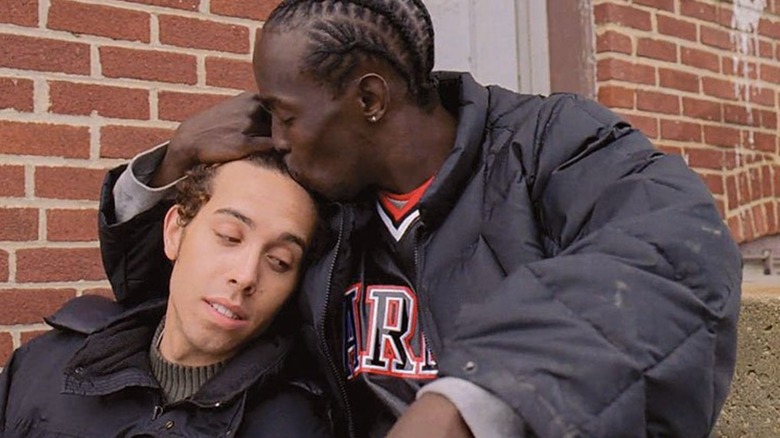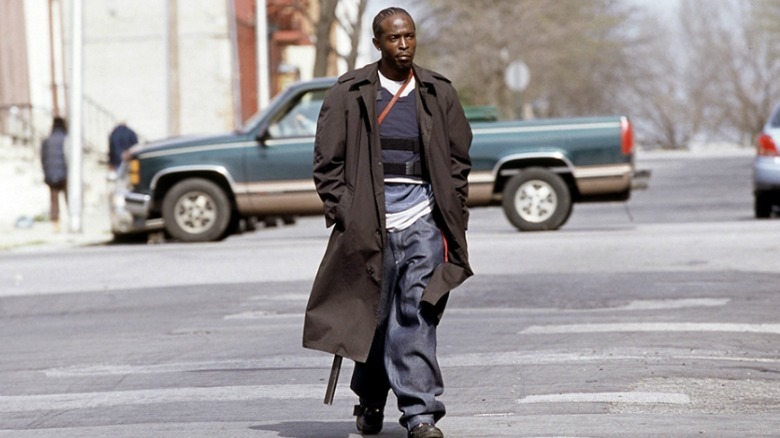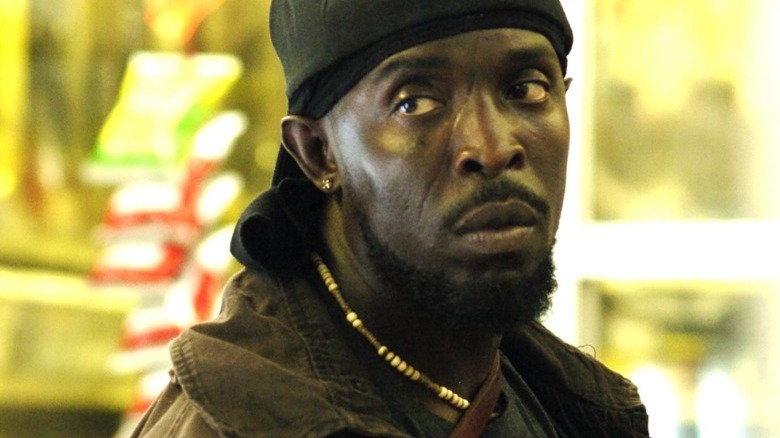Michael K. Williams Wished The Wire Embraced Omar's Sexuality More
The late, great actor Michael K. Williams was always honest, and his honesty shone through in his portrayal of one of the most indelible TV characters of all time. As Omar Little, the openly gay gangster who ruled the Baltimore streets for five seasons of David Simon's "The Wire," Williams brought gravitas and emotion to a role that in lesser hands could have been a misfire. Yet the actor took the intriguing depth that was already on the script page and elevated them, turning Omar into a man as complex as the lore that would eventually surround his season 5 demise.
Williams' memoir, "Scenes From My Life," was published posthumously this summer, and in it the actor wrote at length about the role of Omar. From the pressure he felt as a Black man representing his community, to the inspiration he took from relatives and local figures he grew up around, Williams' book includes significant insights into his role on one of the most critically acclaimed shows of all time. It also revealed that there was one area in which the actor wished the show had pushed the envelope more: Omar's sexuality.
'You know gay people f***, right?'
In an excerpt of "Scenes From My Life" published by Vulture, the actor confesses that he was apprehensive to take on the role of a gay man, a fear that he wrote "came from [his] upbringing, the community that raised [him], and the stubborn stereotypes of gay characters." But once Williams acclimated to the role and realized it wouldn't require him to play a "type," he embraced the character's sexuality and even began to push for it to be better represented.
Despite the many ways "The Wire" broke ground, the show often made Omar's central relationship with Michael Kevin Darnall's Brandon more implicit than explicit. For a series that didn't shy away from gangland violence, as well as heterosexual expressions of love, the lack of intimacy between the pair stands out. "It seemed like everyone was dancing around their intimacy issue," Williams wrote. "There was lots of touching hair and rubbing lips and things like that. I felt like if we were going to do this, we should go all in."
Williams wrote that he felt the directors were afraid of portraying the couple's love in a physical way, saying, "Twenty years ago, men — especially men of color — were not kissing on television. I don't mean it was rare; I mean it did not happen." While another influential HBO show, "Oz," started a few years before "The Wire" featured several gay characters, it's true that the TV landscape at large was devoid of queer intimacy between men of color at the time. "You know gay people f***, right?" Williams recalled saying to one of the directors.
A spontaneous kiss
Eventually, Williams wrote that he decided to take matters into his own hands, proposing an unscripted kiss with Darnall in a first season episode directed by Clark Johnson. The actor wrote about the reaction to the kiss, saying that "everyone stopped what they were doing and went slack-jawed."
Though Omar would eventually lose Brandon in a heartbreaking, character-defining moment, this wasn't the last time Williams would help "The Wire" center queer characters. In the same excerpt, he also recalls meeting Felicia Pearson in a bar and encouraging her to audition for the show. Pearson would ultimately go on to play another fan favorite, the butch lesbian character of the same name, in the show's latter seasons.
Despite its universal acclaim, "The Wire" needn't be remembered as an end point for diversity on television, but a fantastically nuanced modern starting point. It ushered in the 21st century with a story that treated its criminals as humanely as its (often also criminal) cops and ultimately showed a strong Black man who loved his partner deeply. "Omar seemed like the antidote, the answer to everything I had been hiding from," Williams wrote of his fraught and fulfilling time as the character. Two decades later, "The Wire" is an undeniable small-screen classic, and his performance still stands as a poetic, fantastic work all its own.


